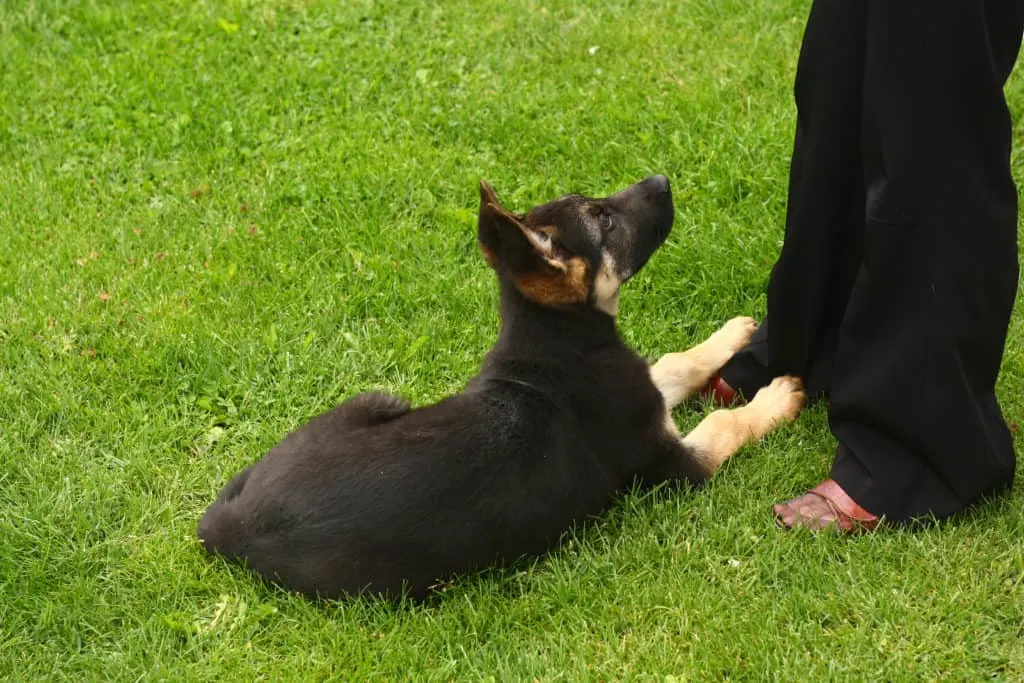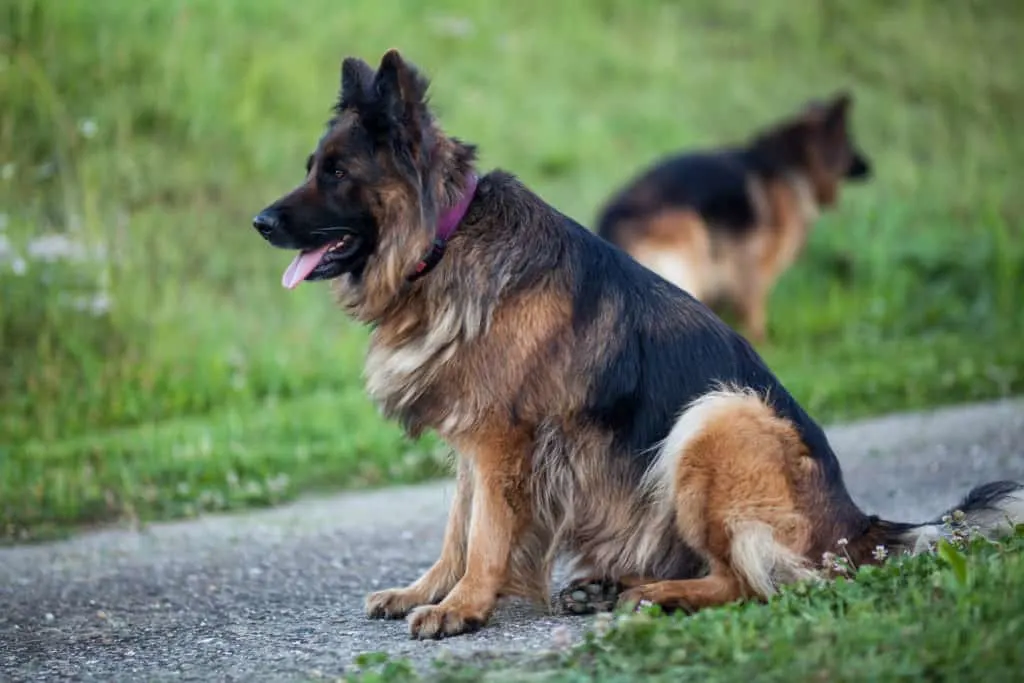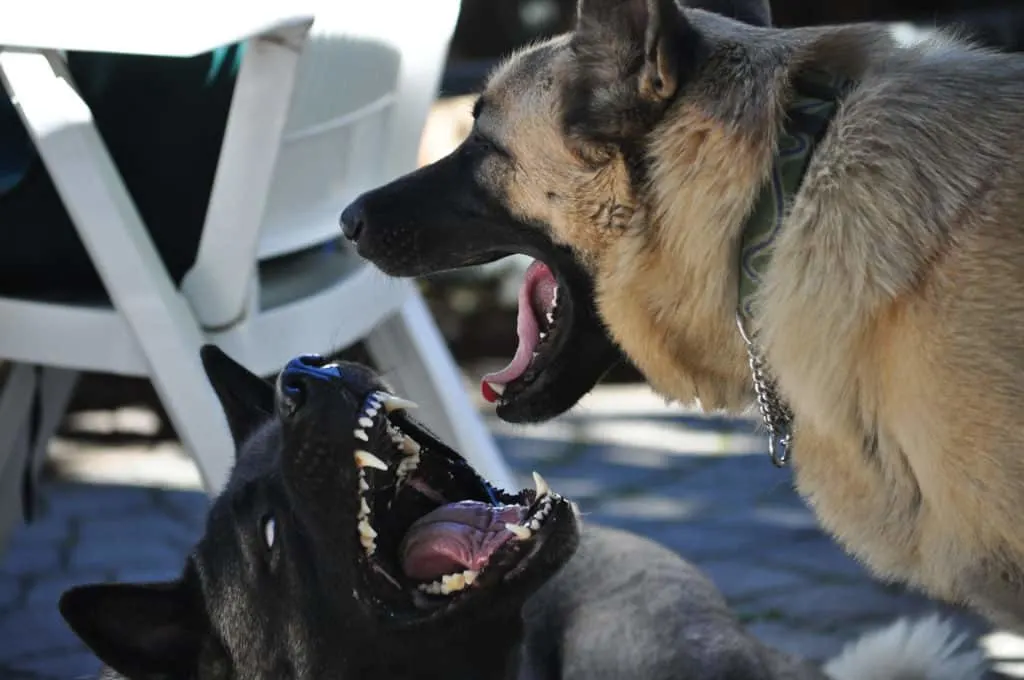
Common misconceptions about the German Shepherd have led to unnecessary fears and false information spreading all over the internet. One such common misconception is about their innate aggression toward people and other animals.
We’re here to set the record straight. While it’s been proven time and time again that German Shepherds are not inherently aggressive toward people, what about other dogs?
So do male German Shepherds get along?
Because German Shepherds have big personalities, two males (or females) could get along just fine, or they could really hate one another and do nothing but fight. Early socialization is key to helping male German Shepherds get along, and neutering male GSDs can help quell aggression as well.
There is nothing quite as terrifying as seeing two huge German Shepherds having an argument. It can be noisy, brutal, and exhausting for the dogs and the people involved.
But not all male GSDs will behave this way toward other males. It comes down to natural temperament, training, early socialization, and sometimes hormones. Below, we’ll dive into whether two male GSDs can get along, and how you can help them do so.
Click Here to Jump to a Section
German Shepherd Males: Behavior
One of the big appeals to the German Shepherd breed is its size. These big dogs are full of muscles, vigor, and spunk, making them prime candidates for working situations, law enforcement, and other active lifestyles.
But they’re also awesome pets for families who don’t want anything more than a good snuggle buddy and someone to go for walks with. Yet, male GSDs have had a bad rap for many years. Why?
Early Behaviors Set the Stage
These intelligent, social, and loyal dogs are known for their strength and boundless energy. Because of this, male GSD puppies are often played with by humans much rougher than the females.
This isn’t always the case, of course. There are plenty of female GSDs that love the rough and tumble, just as there are plenty of males that were pampered and coddled from puppyhood.
But male GSDs can sometimes be seen as overly aggressive, no matter how they were raised in their early days. This behavior (and the resulting opinions of humans) comes from hormones, typically.
Once the adult hormones begin coursing through their bodies, male German Shepherds are just behaving the way nature intended. The biggest, strongest, most alpha dogs win the females; or that’s how it’s supposed to work at least.
Someone forgot to tell Mother Nature that it doesn’t have to be that way anymore and to turn down the male hormones a notch or two.
Early Intervention Can Switch Gears

But you don’t have to wait around to see how your male GSD will grow up and if they’ll be aggressive. In fact, it’s much better if you don’t wait at all. Take the time and effort early on to teach your GSD puppy how you expect him to behave.
Expose him to social situations with dogs and other animals, showing him how you want him to act. These early lessons will follow him well into adulthood, even after the hormones start raging.
There is a lot of evidence showing that puppies of all breeds who are given obedience training early on grow up to be friendlier and better behaved. It also improves their overall happiness.
When dogs understand what’s expected of them, they are happier and more confident. For large dogs, such as a male GSD, this is imperative. A scared, timid male GSD who lacks confidence could easily lash out at people or other dogs.
Getting a male GSD into puppy obedience classes can help set the stage for confidence, obedience, and a sense of purpose. This will be the cornerstone of preparing your male German Shepherd for the rush of hormones and distractions coming around the bend.
By setting this base of obedience now, you’ll be doing your dog a great service for the tough and turbulent adolescent years.
You’re the Boss
Early obedience training shows your GSD puppy right from the start that you are in charge.
Once your male German Shepherd accepts that you are the pack leader, his alpha, he will be more than happy to do as you ask. He will be far less likely to be aggressive toward anyone unless you ask him to. That includes other male German Shepherds, believe it or not.
Establishing dominance is paramount. The earlier your puppy sees you as the boss, the easier his training will become and the more in control you’ll be. This is important because it won’t be long before your male GSD can get up to 95 pounds or more. That’s all muscle, folks.
The Role of Socialization for Two Male German Shepherds

While socialization is important for all dogs, male GSDs can really benefit from this in many ways. They will be big, strong, and capable dogs one day, so starting a puppy on social manners should be a high priority.
German Shepherds are protectors. They have a natural guarding instinct that encompasses their pack (human and other pets) and their property. While guarding instincts are one of the draws of this breed, it can also cause issues out in the wider world.
Unchecked guarding can lead to aggression toward any strangers, no matter where you and your dog happen to be.
By teaching early socialization, your male GSD will quickly learn when guarding behaviors are okay and when he can relax. This will go a long way in helping your male German Shepherd get along with another male GSD.
Can You Have 2 Male German Shepherds?

Yes! You can have two male German Shepherds in the same household. Many people do this successfully. Sadly, there are a few GSD owners who don’t do this the right way and the dogs pay the price.
We cannot stress enough how important good training is. That training should include both obedience and socialization exercises.
Any questionable or concerning behaviors should be addressed immediately. You may even wish to hire a dog behaviorist to help if you find an issue that you can’t seem to get a handle on.
Training should be completed before you bring a second male German Shepherd into the home.
What About Brothers?
It’s sweet to believe that sibling dogs will have the same love and respect for one another as human siblings. The truth is that’s just a case of people humanizing animals.
While dogs have feelings and emotions, they don’t have the same concept of family bonds as humans do. That means two brother German Shepherds are just as likely to fight as non-related males would be.
It comes down to, once again, personality, training, and hormones. Bloodlines mean very little to dogs.
If Both Males Are Already Home
If you already have two male German Shepherds and they haven’t gone through training yet, don’t worry. It’s not hopeless!
The beauty of the German Shepherd breed is their intelligence and loyalty. With those two natural traits so strongly ingrained, you can begin training a GSD any time and have success.
If your two male GSDs already live together and haven’t had any issues yet, you’re in a good position to start training. Make sure you give them each equal attention, firm discipline, and make sure they both see you as the alpha and they should continue to get along.
However, if your male GSDs are already fighting, you’ve got some work ahead of you.
If Two Male GSDs Are Fighting

First and foremost, make sure you and any other people are safe. If the dogs are actively fighting, don’t try to step between them. GSDs are powerful animals and could easily cause injuries to humans, even accidentally.
Instead, have someone help you do the wheelbarrow move. This is simple and effective, keeping all the people and animals safe at the same time.
Each person simply grabs the back legs of one of the dogs and pulls. Lifting the legs off the ground is ideal as it throws off the dogs’ balance. But GSDs are quite heavy and you may need to pull back instead of up. Don’t throw out your back trying to do this!
You can also use a leash as a sling under one of the dogs’ bellies if you’re by yourself. This method is not as easy though. It still leaves one dog untethered.
Preventing Fights
Preventing fights between two male German Shepherds is ideal. There is a lot less chance for injury and you can maintain control much easier this way.
The best way to do this is to keep the dogs in separate areas. You’ll be slowly introducing the dogs in controlled environments and for short periods of time, but overall, two male GSDs who don’t get along should never be left in the same place together long.
Older dogs will need a lot of attention and training to get over their aggressive behaviors. Both dogs should go through training, not just the one you view as the instigator. It’s much easier to control two well-trained German Shepherds than it is if just one follows commands and the other runs amok.
Medical Intervention
Many people find the idea of neutering male German Shepherds disturbing. The fact remains that intact male dogs will almost always find ways to vie for supremacy with one another.
This can be excessive marking in the house or straight up aggression toward each other. If training hasn’t helped and your two male GSDs aren’t getting along, you may need to consider having them neutered.
Hormones can be a powerful force. Even more powerful than your dogs’ desire to please you or to follow commands. If you find yourself in this situation, you only have two options. Keep the dogs separated forever or get them both fixed. Anything less than one of the options will result in injury or even death for one or both dogs.
What About Medications?

If the idea of neutering your male German Shepherds still makes you queasy, you may have one more option before taking that big step. Some dogs just need a little help from medical science to calm down and give life some thought.
High-strung GSDs may benefit from medications designed to calm and soothe them. Under the influence of these mellowing medications, it may be possible to get to male German Shepherds to begin getting along.
Again, be sure to do so carefully, slowly, and under your supervision. Even doped up, German Shepherds can be formidable opponents.
We would caution against keeping your GSDs medicated permanently, however. Unless your vet team believes it’s the best course of action, medications for calming your GSD should be used sparingly and for short periods of time.
There is little point in having a free-spirited, courageous, powerful German Shepherd at your side if he’s completely stoned out of his mind all the time.
Final Thoughts
It is absolutely possible to have two male German Shepherds living in the same household. Even two male GSDs meeting at a dog park can get along. It’s all about early intervention, training, socialization, and a mindful, present human influence.
If you’ve missed the puppy training opportunity, it’s still not too late. Get your GSDs into obedience school as soon as possible and begin supervised social activities to get them ready to be good friends and packmates!
